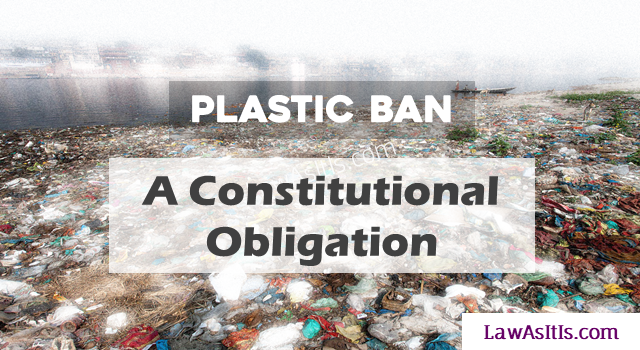Provisions in Constitutional Law to ban usage of plastic in order to protect natural resources and environment
1. Introduction
Plastic is life threatening and one of the worst causes of environmental pollution worldwide. Its widespread usage has choked precious natural and man-made resources. Single use (use and throw) plastic products in particular are extremely difficult to dispose and are the worst form of environmental hazard. In order to protect natural resources plastic ban appears to be the only viable solution.

2. The Constitution of India
We humans are dependent on nature for survival. Maintaining healthy, clean environment is therefore everyone’s responsibility. But when greed overtakes the need, mankind falters. And there emerges the need for regulation. Law to be precise.
The Constitution of India makes it mandatory for both the State and the Citizens to protect natural environment including lakes, rivers, forests and wild life.
2.1 Article 48-A of the Constitution
48A. Protection and improvement of environment and safeguarding of forests and wild life-- The State shall endeavour to protect and improve the environment and to safeguard the forests and wild life of the country.
This provision of Constitution makes it the paramount obligation of the State to conserve natural environment, thereby empowering the State to take adequate measures for its protection and improvement.
Consequently, in 1999 Central Government formulated Plastic Manufacture and Usage Rules, 1999 for regulating manufacture and sale of plastic carry bags. This was superseded by Plastic Waste (Management and Handling) Rules, 2011, which was again superseded by Plastic Waste Management Rules, 2016. Intention was to regulate the trade and business of manufacturers, importers, stockists, distribution agents, sale and use of carry bags, plastic sheets etc.
As per 2016 rules the carry bags and plastic packaging should be in natural shade without any added pigments and conforming to IS 9833 : 1981 titled list of pigments and colourants for use in plastics in contact with foodstuffs, pharmaceuticals and drinking water (as amended). It further stipulates that carry bags should not be less than fifty microns in thickness if they are made of virgin or recycled plastic. There are other stipulations also with an intent to regulate and control use of plastic so as to minimise plastic waste.
2.2 Article 51-A of the Constitution
51A. Fundamental duties - It shall be the duty of every citizen of India -
(a) to abide by the Constitution and respect its ideals and institutions, the national Flag and the National Anthem;
(b) to cherish and follow the noble ideals which inspired our national struggle for freedom;
(c) to uphold and protect the sovereignty, unity and integrity of India;
(d) to defend the country and render national service when called upon to do so;
(e) to promote harmony and the spirit of common brotherhood amongst all the people of India transcending religious, linguistic and regional or sectional diversities; to renounce practices derogatory to the dignity of women;
(f) to value and preserve the rich heritage of our composite culture;
(g) to protect and improve the natural environment including forests, lakes, rivers and wild life, and to have compassion for living creatures;
(h) to develop the scientific temper, humanism and the spirit of inquiry and reform;
(i) to safeguard public property and to abjure violence;
(j) to strive towards excellence in all spheres of individual and collective activity so that the nation constantly rises to higher levels of endeavour and achievement.
(k) who is a parent or guardian to provide opportunities for education to his child or, as the case may be, ward between the age of six and fourteen years.
Article 51-A(g) makes it the fundamental duty of every citizen to not only protect the natural environment but also to improve it.
Thus concerted and collective effort of citizens is intrinsic to fulfil this constitutional obligation. Plastic manufacturers, stockists, sellers are as responsible as consumers of plastic.
3. Need for alternate solutions besides plastic ban
Single use plastic ban will require alternate solutions like cloth and jute carry bags, utensil banks, recycled paper, clay, glass, banana leaves, biodegradable single use material, and most of all Awareness Campaigns by Non-Profits/ NGOs/RWAs to raise consciousness about environment protection and improvement.